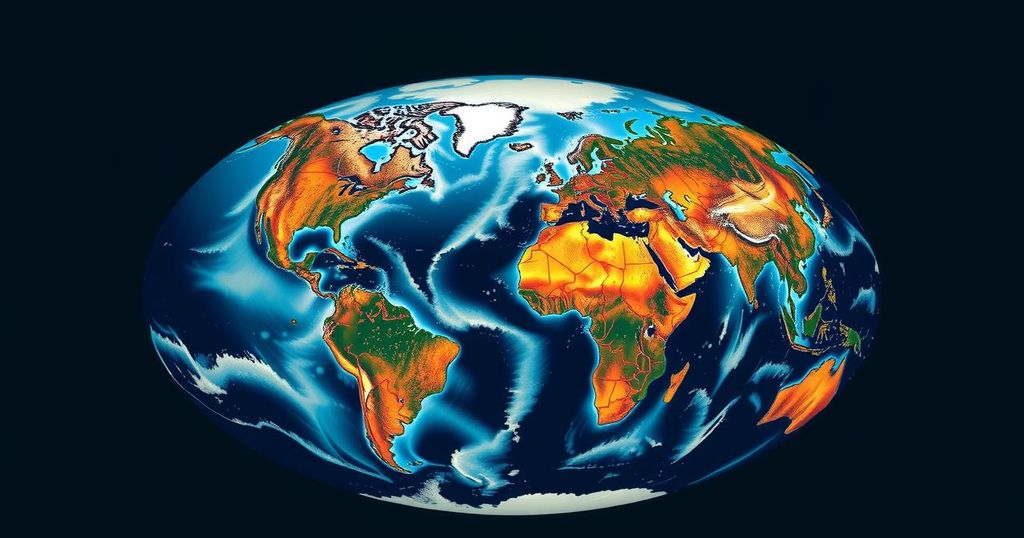Greenhouse Gas Emissions Surge Amidst Rising Global Temperatures and Wildfires
Wildfires in 2022 have contributed to rising greenhouse gas levels, with atmospheric carbon dioxide now at levels seen 2-3 million years ago. The WMO warns that emissions are surpassing natural absorption rates, creating a potentially dangerous climate feedback loop. The upcoming U.N. climate talks will address these urgent issues amidst a backdrop of increasing temperatures and rising sea levels.
BANGKOK — Last year’s severe wildfires have exacerbated the rapid increase of greenhouse gases in the Earth’s atmosphere, creating a potentially dangerous feedback loop as global temperatures continue to rise, according to the United Nations weather agency in their latest Greenhouse Gas Bulletin. The report reveals that the levels of carbon dioxide in the atmosphere are now comparable to those from 2 to 3 million years ago when global temperatures were as much as 3 degrees Celsius higher and sea levels were 10 to 20 meters higher than present levels. The World Meteorological Organization (WMO) has indicated that the continuous emissions of carbon dioxide from fossil fuels and cement production surpass the absorption capacity of oceans and forests, with the surplus contributing to the greenhouse effect and persistent climate warming. Ko Barrett, the agency’s deputy secretary general, emphasized the significance of temperature increases, stating, “Every fraction of a degree of temperature increase matters. It matters in terms of the speed of glacier and ice retreat, the acceleration of sea-level rise, ocean heat and acidification. It matters in terms of the number of people who will be exposed to extreme heat every year, the extinction of species, the impact on our ecosystems and economies.” In light of the upcoming 29th U.N. climate negotiations next month in Azerbaijan, an authoritarian regime with a heavy reliance on oil and gas exports, the urgency of addressing greenhouse gas emissions has never been greater. The 2015 climate agreements aimed to limit the average global temperature increase to 1.5 degrees Celsius above preindustrial levels, with current increases nearing 1.2 degrees Celsius and sea levels having already risen by approximately 24 centimeters since 1880. The report also pointed out that catastrophic wildfires in Canada and severe bushfires in Australia have contributed to persistently high carbon dioxide emissions this year. Furthermore, it forecasted a potential decrease in carbon dioxide absorption by forests due to the transition from La Niña to El Niño, which may hamper plant growth and reduce their capability to sequester carbon. The WMO reported that the average concentration of carbon dioxide reached 420 parts per million in 2023, marking the twelfth consecutive year of a notable increase. As highlighted in the bulletin, “Carbon dioxide is accumulating in the atmosphere faster than at any time during human existence.” If current trends continue, the world may face severe repercussions from intensified temperatures as the environment becomes an increasing source of greenhouse gases through phenomena such as wildfires and the diminishing capacity of warmer oceans to absorb carbon dioxide. The WMO cautioned that “These climate feedbacks are critical concerns to societies worldwide.”
Global warming represents one of the most pressing challenges faced by humanity today, largely driven by the accumulation of greenhouse gases such as carbon dioxide in the atmosphere. Human activities, particularly the burning of fossil fuels, deforestation, and industrial processes, have significantly raised these gas levels, thus amplifying the greenhouse effect. Severe weather events, including wildfires and heatwaves, underscore the escalating nature of this crisis and emphasize the need for urgent action and international cooperation to mitigate its impacts. The upcoming international climate negotiations spotlight the tension between economic dependencies on fossil fuels and the necessity of implementing sustainable practices to combat climate change.
In conclusion, the recent findings from the World Meteorological Organization underline the critical and urgent issues surrounding greenhouse gas emissions, particularly driven by human activities and natural feedback mechanisms. As the global community prepares for the forthcoming climate negotiations, it is essential to address the implications of climate change and to strive for effective strategies that will help mitigate its progress. Protecting ecosystems and limiting temperature increases is imperative not only for the environment but also for human health and global stability.
Original Source: www.rfa.org




Post Comment